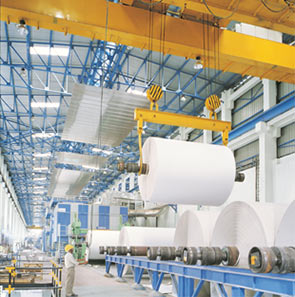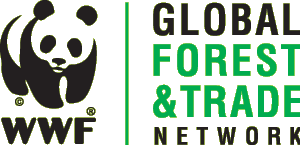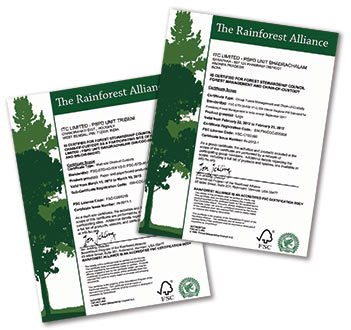Environmental Performance
Material Sustainability in ITC's Businesses
All ITC Units continue to pursue efficient use of raw materials through extensive R&D and waste elimination/reduction through process management. In addition, all Businesses are focused on sustainable sourcing of raw materials to ensure its long-term availability at optimum and competitive prices.
 A very significant and large proportion of raw materials in ITC businesses are sourced from agricultural farms and plantations. Our initiatives in developing large scale Social and farm forestry plantations, watershed developments, empowering the marginal farmers through e-Choupals (described elsewhere in this report) have helped in ensuring raw material sustainability in ITC Businesses. In 2011-12, ITC consumed over 16,00,000 tonnes of materials, out of which close to 94% of raw materials are agri based and thus renewable.
A very significant and large proportion of raw materials in ITC businesses are sourced from agricultural farms and plantations. Our initiatives in developing large scale Social and farm forestry plantations, watershed developments, empowering the marginal farmers through e-Choupals (described elsewhere in this report) have helped in ensuring raw material sustainability in ITC Businesses. In 2011-12, ITC consumed over 16,00,000 tonnes of materials, out of which close to 94% of raw materials are agri based and thus renewable.
Environmental Footprint of Our Products:
ITC products can be broadly classified into the following categories:
1. FMCG (B to C) Products:
Cigarettes, Foods, Personal Care Products.
2. Industrial Supplies and Exports:
Paper, Paperboards, Packaging; Leaf Tobacco, etc.
3. Services:
Hotels and ITC Infotech.
Since ITC is vertically integrated to a large extent, it provides opportunities for successive value addition, within the system for several categories of products such as paperboards for packaging. This integration provides the Company unique opportunities to establish synergy thereby minimising environmental impact through optimum utilisation of raw materials, recycling/reuse of wastes and optimum logistics and transportation. This synergy, significantly, reduces environmental footprint of ITC products and services.
We have completed studies on life cycle assessment of some of our products/ services. Based on the outcome of these studies, we plan to carry out more life cycle assessment of products/services to evaluate the environmental impacts at the various life cycle stages. This would help us in identifying opportunities for improving their environmental attributes.
Responsible Sourcing of Wood Fibre:
 Wood is a major source of fibre for the paper and paperboards industry. Availability of wood remains a critical challenge and is a serious sustainability concern, especially in a country with limited natural resources and acute income inequities.
Wood is a major source of fibre for the paper and paperboards industry. Availability of wood remains a critical challenge and is a serious sustainability concern, especially in a country with limited natural resources and acute income inequities.
Approximately 59% of the total fibre requirements of ITC’s Paperboards and Specialty Papers Division is met by the Organisation’s social and farm forestry projects, another 17% comes from recycled fibre, processed at Kovai and Bhadrachalam and the balance 24% is imported pulp used at Bhadrachalam and Tribeni Units. 90.3% of fibre manufactured in Bhadrachalam is from wood sourced from our social and farm forestry initiatives and the balance (9.7%) is from other sources. Fibre for operations at the Kovai Unit is totally sourced from recycled waste. 100% of wood and recycled fiber used by ITC’s Paperboards and Specialty Papers Business is of known and legal origin. Internal R&D has produced high yielding, site specific, disease resistant eucalyptus and subabul clones on the back of extensive knowledge of plantation management practices. ITC distributed 57.44 million high quality saplings to farmers and planted 11,000 hectares during the year.
Apart from the obvious benefits of increasing the green cover, plantation on degradable wastelands under the social forestry programme also directly contributes to in-situ moisture conservation, ground water recharge and significant reduction in topsoil losses caused by wind and water erosion. In addition, as a result of the leaf litter from multi-species plantations and the promotion of leguminous intercrops, depleted soils are constantly enriched.
Forest Stewardship Council® Certifications
Further consolidating ITC’s Triple Bottom Line performance, the four units of ITC’s Paperboards and Specialty Papers Division i.e Bhadrachalam, Bollaram, Kovai and Tribeni, received the prestigious 'FSC® Chain of Custody' Certification from 2009 onwards and have been maintaining it.
 The FSC (Forest Stewardship Council) is an independent, non-governmental; not-for-profit organisation established to promote the responsible management of the world’s forests and is recognised as the gold standard in the wood certification for ethical and legal sourcing. The FSC is represented in more than 107 countries around the world, and is the most widely accepted and respected amongst forest product certification schemes.
The FSC (Forest Stewardship Council) is an independent, non-governmental; not-for-profit organisation established to promote the responsible management of the world’s forests and is recognised as the gold standard in the wood certification for ethical and legal sourcing. The FSC is represented in more than 107 countries around the world, and is the most widely accepted and respected amongst forest product certification schemes.
FSC endorsement implies that an organisation complies with its principles and criteria in the different areas of its functioning.
ITC’s Paper and Paperboard Division can now supply FSC certified paper /paperboards from all its four Units with the FSC claim of ‘FSC Mixed’ or ‘FSC Recycled’. FSC logo on products enables customers to buy confidently knowing that the products/packaging is from legal, sustainable and well managed sources
The FSC certification for ITC’s Paperboards and Specialty Papers Units exemplifies the organisation’s continued commitment to sustainable business practices and to the building of an inclusive and secure future for both its stake holders and the larger society.
In continuation of its commitment to expand its scope the organisation also got about 8,028 hectares of plantations owned by more than 9,000 small and marginal farmers certified for FSC – Forest Management as Group Manager. This ensures more supply of FSC certified wood to its operations thereby giving options of reaching more certified material to the market. This certification brings better environmental practices and improves social benefits to the community around the Khammam district of Andhra Pradesh where the farm plots are located. The organisation is planning to bring in more areas under FSC – FM certification in the future.